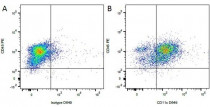ARG23428
anti-CD11c antibody [CA11.6A1]
anti-CD11c antibody [CA11.6A1] for Flow cytometry,IHC-Frozen sections,Immunoprecipitation and Dog
Overview
| Product Description | Mouse Monoclonal antibody [CA11.6A1] recognizes CD11c Mouse anti Dog CD11c antibody, clone CA11.6A1 recognises the canine CD11c cell surface antigen, a member of the alpha integrin family. Canine CD11c is expressed by monocytes, granulocytes and by dendritic cells.Mouse anti Dog CD11c, clone CA11.6A1 immunoprecipitates proteins of approximately 95 kDa, corresponding to the common β chain of the CD11/CD18 heterodimer and 150 kDa, the CD11c; chain from canine leukocyte preparations (Danilenko et al. 1992) |
|---|---|
| Tested Reactivity | Dog |
| Tested Application | FACS, IHC-Fr, IP |
| Host | Mouse |
| Clonality | Monoclonal |
| Clone | CA11.6A1 |
| Isotype | IgG1 |
| Target Name | CD11c |
| Antigen Species | Dog |
| Conjugation | Un-conjugated |
| Alternate Names | CD antigen CD11c; Leu M5; CD11C; SLEB6; Integrin alpha-X; Leukocyte adhesion glycoprotein p150,95 alpha chain; Leukocyte adhesion receptor p150,95; CD11 antigen-like family member C |
Application Instructions
| Application Suggestion |
|
||||||||
|---|---|---|---|---|---|---|---|---|---|
| Application Note | IHC-Fr: The epitope recognized by this antibody is reported to be sensitive to formaldehyde fixation and tissue processing. Arigo recommends the use of acetone fixation for frozen sections. FACS: Use 10 µl of the suggested working dilution to label 10^6 cells or 100 µl whole blood. * The dilutions indicate recommended starting dilutions and the optimal dilutions or concentrations should be determined by the scientist. |
Properties
| Form | Liquid |
|---|---|
| Purification | Tissue Culture Supernatant. |
| Buffer | Tissue Culture Supernatant and 0.1% Sodium azide. |
| Preservative | 0.1% Sodium azide |
| Storage Instruction | For continuous use, store undiluted antibody at 2-8°C for up to a week. For long-term storage, aliquot and store at -20°C or below. Storage in frost free freezers is not recommended. Avoid repeated freeze/thaw cycles. Suggest spin the vial prior to opening. The antibody solution should be gently mixed before use. |
| Note | For laboratory research only, not for drug, diagnostic or other use. |
Bioinformation
| Gene Symbol | ITGAX |
|---|---|
| Gene Full Name | integrin, alpha X (complement component 3 receptor 4 subunit) |
| Background | This gene encodes the integrin alpha X chain protein. Integrins are heterodimeric integral membrane proteins composed of an alpha chain and a beta chain. This protein combines with the beta 2 chain (ITGB2) to form a leukocyte-specific integrin referred to as inactivated-C3b (iC3b) receptor 4 (CR4). The alpha X beta 2 complex seems to overlap the properties of the alpha M beta 2 integrin in the adherence of neutrophils and monocytes to stimulated endothelium cells, and in the phagocytosis of complement coated particles. Two transcript variants encoding different isoforms have been found for this gene. [provided by RefSeq, Nov 2013] |
| Function | Integrin alpha-X/beta-2 is a receptor for fibrinogen. It recognizes the sequence G-P-R in fibrinogen. It mediates cell-cell interaction during inflammatory responses. It is especially important in monocyte adhesion and chemotaxis. [UniProt] |
| Calculated MW | 128 kDa |
Images (1) Click the Picture to Zoom In
-
ARG23428 anti-CD11c antibody [CA11.6A1] FACS image
Flow Cytometry: Figure A. PE conjugated Mouse anti Canine CD45 and purified Mouse IgG1 isotype control detected with Goat anti Mouse IgG1 DyLight 649. Figure B. FITC conjugated Mouse anti Canine CD45 and ARG23428 anti-CD11c antibody [CA11.6A1] detected with Goat anti Mouse IgG1 DyLight 649. All experiments performed on red cell lysed Canine blood gated on monocytes.






